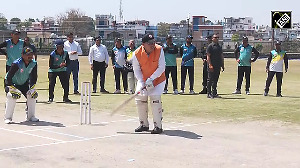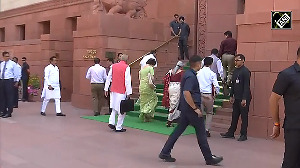Will Lieutenant Governor Manoj Sinha, who gets his orders from New Delhi, call the shots or allow a democratically elected government to independently govern, questions Ramesh Menon.

The Kashmir election was not something that the Narendra D Modi government wanted.
But when the Supreme Court directed that it be conducted, the Bharatiya Janata Party was at its aggressive best, like it always does in any election.
It won 29 seats in Jammu, bettering its earlier record, but could not reach a majority mark to form a government. It drew a blank in the Muslim-dominated Kashmir Valley.
The National Conference, led by former chief minister Omar Abdullah, won 42 seats.
As it was in alliance with the Congress, it added another six seats to its tally, comfortably romping home with a majority.
The NC contested 56 seats, winning 75 per cent of them, winning 27 more seats than what it won in the 2014 assembly elections.
As its vote share rose from 20.77 per cent to 23.43 per cent, the party has something to look forward to.
This was a significant election in the Union Territory's history, as it was the first after Article 370 was revoked, which gave special powers to the erstwhile state of Jammu and Kashmir.
The debate on it continues, with many feeling that it was inevitable to integrate Kashmir into the political entity and culture of India.
Others argue that it was an act of a majoritarian government to whittle down the identity of Jammu and Kashmir and dilute the autonomy it enjoyed.
What stood out was that this was an election without separatists and militant organisations calling for a boycott, as was seen in the last 30 years. In fact, they were very much in the fray.
A looming positive sign was how the electorate rejected all the 28 former militants and separatists, along with ten other independents backed by Jamaat-e-Islami, who were banned in 2019.
The voter turnout of 63.9 per cent was an indication of how the people wanted an elected government to rule them and that they wanted peace and stability.
Though polarised politics was evident with the mandate meandering along communal lines, it was a watershed moment, as it was seen as one that would end political uncertainty.
The geographically split mandate was too stark to be ignored, as the results of Kashmir and Jammu were distinctly different.

Engineer Rashid, who had won the Lok Sabha election when he was in jail defeating candidates like Omar Abdullah, was released so that he could campaign in the assembly election.
Buoyed by his Lok Sabha election victory, he got his Awami Ittehad Party to field 34 candidates supported by extremist groups and parties.
Only one won with a margin of 1,602 votes.
Thirty-one of them lost their deposit. Nine of them got less than 1,000 votes.
Eyes were on his party's fortunes as it would spin the future narrative of Kashmir. His earlier win, widely celebrated and reported, seemed like a fluke.
Afzal Guru's brother, Aijaz Ahmed Guru, contesting as an Independent from Sopore, got only 129 votes. Afzal Guru was hanged in 2013 after he was convicted for his role in the Parliament attack in 2001.
Similarly, Mohammad Farooq Khan, a former Jammu Kashmir Liberation Front commander, lost to Shamim Firdous of the National Conference.
Khan was among the early militants who had crossed over to Pakistan occupied Kashmir in 1989.
Hafiz Mohammad Sikandar Malik, a former district president of Jammat-e-Islami, who contested as an Independent, ended up sixth in the Bandipora seat.
He was 17,980 votes behind the winning Congress candidate, Nizamuddin Bhat.
The police had strapped a GPS tracker on one of his ankles to keep a tab on him as the National Investigating Agency was investigating him.
Voters rooted for established political parties rather than for hyper-local Independents. Clearly, voters were looking for peace and stability.

The Congress had little to celebrate. It has a lot to worry about as its vote share fell from 18.01 per cent to 11.97 per cent now, winning just six seats.
It contested 39 seats in 2014, where it had won 12 seats. In Hindu-dominated Jammu, with 43 constituencies, it won just one seat by a narrow margin.
Congress leader Rahul Gandhi led rallies in safe constituencies in Kashmir and largely ignored Jammu.
The party paid for it, and Omar Abdullah remarked that he was disappointed with the Congress performance in Jammu.
The worst performer among mainline parties was Mehbooba Mufti's Peoples Democratic Party.
It won just three seats out of the 80 it contested. Its vote share shrank to 8.87 per cent. It was 22.67 per cent in 2014, winning 28 seats.
This was the worst performance by the PDP ever since it was founded in 1999 by Mehbooba's father Mufti Mohammad Sayeed.
In 2014, the PDP won 28 seats. With many of its leaders abandoning her party, it will be challenging for Mehbooba to put the flock together.
In the PDP strongholds of Kulgam Anantnag, Shopian and Pulwama, the NC won 10 of the 15 seats.
Mehbooba decided not to contest; instead her daughter, Iltija Mufti contested from Bijbehara-Srigufwara. She lost.
The seat was previously held by her mother and grandfather Mufti Mohammad Sayeed, who were both chief ministers.
When she was studying international relations at Warwick in the United Kingdom, it did not seem that Iltija would want to enter the complicated web of politics in Kashmir. But last year, Mehbooba appointed her as her media advisor.
Mehbooba said the PDP will support the Omar Abdullah government. She has no choice, as her three seats in the assembly mean nothing.

The next five years are not going to be easy for Omar Abdullah. There are numerous challenges he would have to battle with.
The prime one is whether he will face a Kejriwal-like situation where the Aam Aadmi Party, despite having a vast majority in Delhi, cannot function independently due to constant interference from the lieutenant governor who has extensive powers.
Omar faces a similar predicament. Will Lieutenant Governor Manoj Sinha, who gets his orders from New Delhi, call the shots or allow a democratically elected party to independently govern?
On July 12, 2024, the Centre amended the Transaction of Business of the Government of Union Territory of Jammu and Kashmir.
This makes it mandatory for all decisions on postings and transfers of secretary-level officers, the appointment of law officers, and grant or refusal of prosecution, sanction, and prison-related matters to be cleared by the LG.
Will Omar, with his comfortable majority, be allowed to write a new chapter in the history of his troubled state? Or will he be reduced to a titular head without any powers?
Will statehood be restored? The Centre has been vague on this count, as it has said it would do it depending on the circumstances it will define.
Both the National Conference and Congress said during their campaigns that it would work to win statehood back along with the restoration of Article 370.
However, Omar is realistic enough to admit that it will not be easy.
The BJP MLAs from Jammu will have little say for the next five years and are likely to raise a demand for a separate Jammu state, a call that has been in the air for some time.
Clearly, it will not be an easy ride for the new government.
Ramesh Menon, award-winning journalist, educator, documentary film-maker and corporate trainer, is the author of Modi Demystified: The Making Of A Prime Minister.
Feature Presentation: Aslam Hunani/Rediff.com






 © 2025
© 2025